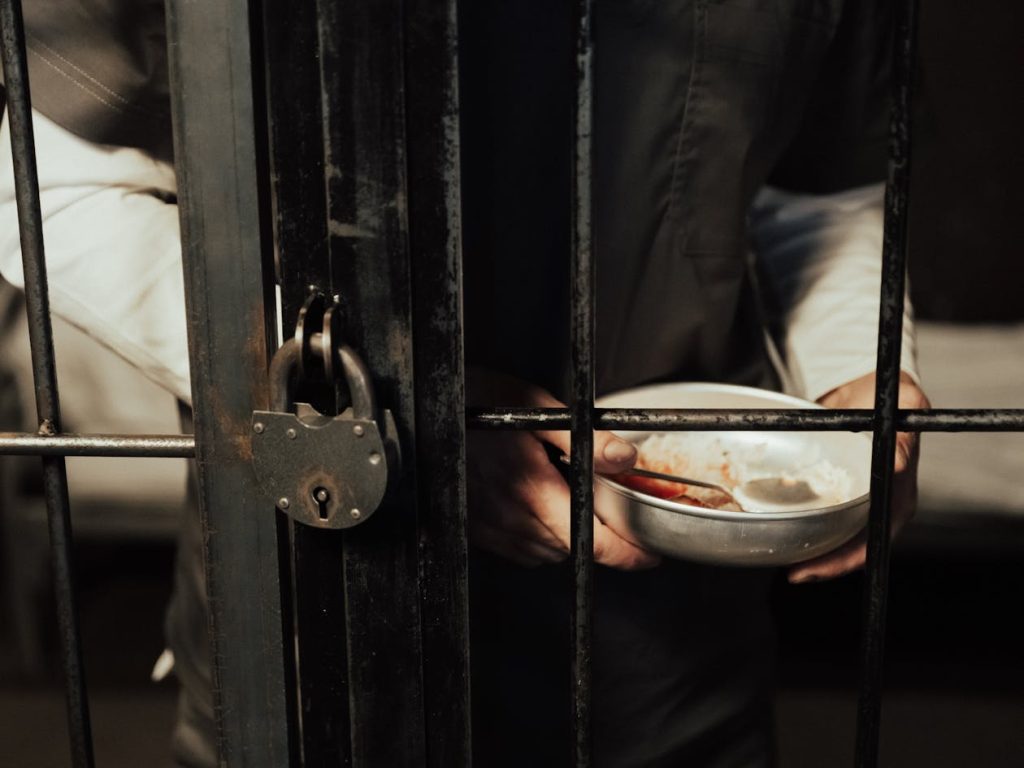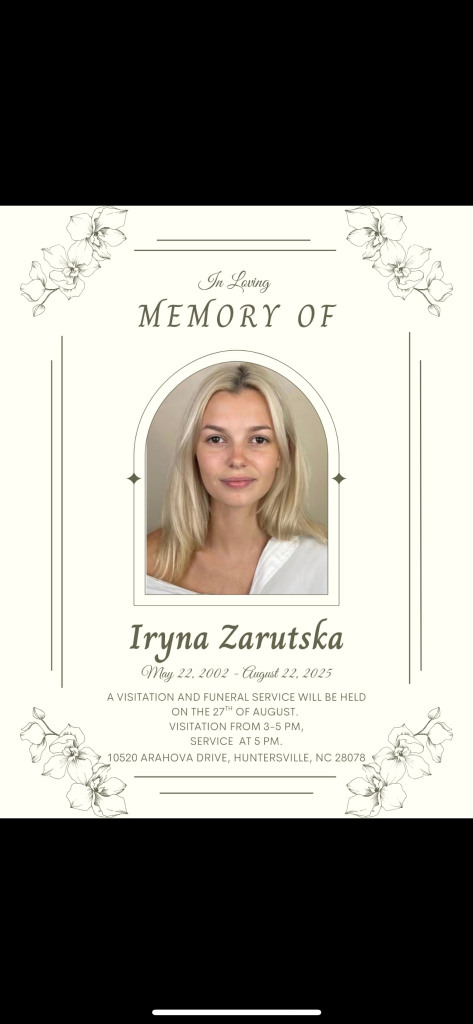Your cart is currently empty!
Man Who Fatally Stabbed Ukrainian Refugee on Train Could Now Face Death Penalty

A federal grand jury in North Carolina has escalated charges against Decarlos Brown Jr., potentially putting his life on the line for the brutal killing of a Ukrainian refugee on a Charlotte train. On October 22, 2025, prosecutors secured an indictment for violence against a railroad carrier and mass transportation system resulting in death, a charge that carries capital punishment as a possible sentence.
Brown, 34, already faced state charges of first-degree murder in the August 22 attack on Iryna Zarutska. Federal authorities determined the case warranted additional prosecution under laws protecting mass transportation systems. Lauren O. Newton, an attorney representing Zarutska’s family, said that they are pleased with the indictment and look forward to swift justice for Iryna.
Grand jurors found that Brown intentionally killed Zarutska in an unprovoked attack that shocked the Charlotte community and drew national attention. U.S. Attorney Russ Ferguson indicated the investigation remains active, with prosecutors evaluating whether to pursue additional federal charges.
Four Minutes From Boarding to Fatal Attack
Surveillance cameras captured the sequence of events that ended Zarutska’s life on a late summer evening. At 9:46 PM, the 23-year-old boarded a Lynx Blue Line train at the Scaleybark station in Charlotte’s South End neighborhood. She had just finished her shift at a local pizzeria and texted her boyfriend to say she would be home soon.
Zarutska sat down in a seat one row ahead of Brown, who had already been riding the train for several hours. Video footage shows Brown making unusual movements and laughing to himself as he traveled through the city. Security officials had passed him earlier that evening but did not interact with him.
Four minutes after Zarutska boarded, Brown pulled a pocketknife from his hoodie pocket. He unfolded the blade and struck her three times from behind, including at least once in the neck. Zarutska remained conscious or semi-conscious for nearly a minute before collapsing on the floor. She was pronounced dead at the scene.
At least four other passengers sat nearby during the attack. No security personnel were present in the train car, though officers were stationed one car ahead. Witnesses assisted after Zarutska collapsed, but her injuries proved fatal.
Brown exited the train two minutes after the stabbing. Officers arrested him on the platform at the East/West Boulevard station. He received treatment for a hand wound before being taken into custody.
Ukrainian Refugee Fled War Only to Die Seeking Safety
Iryna Zarutska was born in Kyiv, Ukraine, on May 22, 2002. She studied at Synergy College in her home city and earned a degree in art and restoration. Her life took a dark turn in 2022 when Russian forces invaded Ukraine, forcing her family from their apartment into a small bomb shelter where they lived for months under constant threat of bombing.
Zarutska, her mother, her sister, and her younger brother immigrated to the United States in 2022. Her father remained in Ukraine, barred from leaving under martial law that prevented men between the ages of 18 and 60 from departing the country. He was later unable to attend his daughter’s funeral in America.
In Huntersville, North Carolina, Zarutska rebuilt her life from scratch. She worked multiple jobs after receiving her work permit, including positions at a senior citizens center and Zepeddie’s Pizzeria. Coworkers remember her as dedicated and warm. She took community college courses to improve her English, which she mastered with speed. Her boyfriend gave her driving lessons since the family had never owned a car.
Zarutska loved animals and often cared for her neighbors’ pets, walking them through the neighborhood with what friends described as a radiant smile. She dreamed of becoming a veterinary assistant. On social media, she shared her artwork and creative designs for eclectic clothing that reflected her personality.
Accused Killer’s 14 Arrests and Schizophrenia Diagnosis

Brown had been arrested 14 times in Mecklenburg County before the stabbing, with criminal charges dating back to 2007. His record included convictions for armed robbery, felony larceny, and breaking. Court records show he served more than five years in state prison for robbery with a dangerous weapon, from 2015 to September 2020.
Upon his release, Brown lived with his family but displayed troubling behavioral changes. His mother told ABC News that doctors diagnosed him with schizophrenia during this period. He experienced hallucinations and paranoia, telling his sister multiple times that the government had implanted a chip in him.
Brown’s sister, Tracey Brown, said her brother became aggressive. He attacked her in 2022, leading to his arrest. She decided to drop the charges out of concern for his mental health struggles. After his release in 2020, he didn’t seem like himself and struggled to hold conversations and maintain employment, according to his sister.
His mother attempted to get him placed in a long-term psychiatric facility, but her efforts failed because she was not his legal guardian. Brown stopped taking psychiatric medication, and his mother eventually took him to a homeless shelter. North Carolina reduced the capacity of state hospitals in the early 2000s, and the average wait time for a psychiatric bed reached 16 days in 2024.
January Release Sparks Fierce Debate Over Bail Reform

Brown’s encounter with law enforcement in January 2025 would become a flashpoint in debates over criminal justice policy. Officers responded to repeated 911 calls from Brown, who claimed a man-made material inside him was controlling when he ate, walked, and talked. Police told him the issue was medical and that they could do nothing. Brown grew upset and continued calling 911.
Authorities charged him with misuse of 911, a class 1 misdemeanor. A magistrate judge released him on a written promise to appear for his next hearing. He was not required to post bond. Seven months later, Zarutska lay dead on a train floor.
State court records show North Carolina listed 14 cases for Brown beyond those related to Zarutska’s killing. Cases ranged from minor offenses like speeding and shoplifting to serious felonies. How many were prosecuted remains unclear.
Mecklenburg County Chief District Court Judge Roy Wiggins announced he would review local bond policy as a result of the case. He also said he would evaluate whether proper procedures were followed and would educate magistrates on the impact of their decisions regarding pretrial conditions of release.
Involuntary psychiatric commitment proved difficult to obtain in North Carolina unless a court found the person dangerous. Brown’s family struggled to navigate a system that appeared to offer few options for someone exhibiting clear signs of severe mental illness.
Attorney General Bondi Vows Maximum Penalty

Attorney General Pam Bondi moved swiftly to federalize the case. In a statement, she declared: “Iryna Zarutska was a young woman living the American dream. Her horrific murder is a direct result of failed soft-on-crime policies that put criminals before innocent people.”
Bondi directed her attorneys to prosecute Brown federally, calling him a repeat violent offender with a history of violent crime. She vowed to seek the maximum penalty, adding that Brown “will never again see the light of day as a free man.”
FBI Director Kash Patel praised the federal charges. “The brutal attack on Iryna Zarutska on the Charlotte Light Rail was a disgraceful act that should never happen in America,” Patel said, thanking Bondi “for her pursuit of today’s federal charges, which are the first step toward delivering justice for Iryna and her family.”
President Donald Trump voiced support for capital punishment in the case. He called Brown a “madman” and “lunatic” during a September 8 speech at the Museum of the Bible, saying “when you have horrible killings, you have to take horrible actions.”
If convicted on the federal charge, Brown faces either life in prison without parole or execution. His sentence would be determined by the court based on advisory sentencing guidelines and other statutory factors.
North Carolina Passes Iryna’s Law in Three Weeks
State lawmakers moved with unusual speed to pass legislation in response to the killing. House Bill 307, dubbed “Iryna’s Law,” sailed through the North Carolina General Assembly with bipartisan support.
On September 22, the Senate passed the bill 28 to 8. One day later, the House approved it 81 to 31. Governor Josh Stein signed Iryna’s Law on October 3, less than six weeks after Zarutska’s death.
Measures in the new law include removing cashless bail for certain offenses and defining a category of violent crimes for which judges or magistrates must impose conditions for pretrial release, such as GPS monitoring. Courts must now order mental health evaluations under an established protocol.
Iryna’s Law requires appeals against death sentences to be heard by the end of 2027. It gives North Carolina’s chief justice the ability to suspend magistrates and establishes that a victim using public transportation at the time of a crime can be considered an aggravating factor when seeking the death penalty.
One provision directs the North Carolina Department of Adult Correction to identify alternative methods of carrying out death sentences if lethal injection becomes unconstitutional or impossible due to unavailable drugs. Senate President pro tempore Phil Berger said he would seek to revive capital punishment in North Carolina, where no executions have occurred since 2006.
Community Honors Victim With Vigils and Murals

On August 31, a candlelight vigil in Charlotte honored Zarutska and other recent victims of transit violence. North Carolina officials announced another vigil marking 30 days after her death, scheduled for September 22 at the East/West Boulevard station where she died.
Fundraising efforts began for memorial murals across the United States. In September, rapper DaBaby released a song titled “Save Me” dedicated to Zarutska, with a music video that reenacted the event but showed him intervening to save her life.
In October, scientists named a newly discovered species of butterfly in her honor. “Celastrina Iryna,” found in coastal areas of Georgia and South Carolina, became a permanent tribute to the young woman whose life ended too soon.
Legal Team Prepares Capital Defense Strategy
U.S. Magistrate Judge Susan Rodriguez appointed capital defense lawyer Joshua Kendrick to represent Brown. Kendrick works alongside federal public defenders Mary Ellen Coleman and Megan Hoffman on a case that could end with their client’s execution.
In October, officials announced that a Rule 24 court hearing to determine whether Brown would face the death penalty had been delayed to April 2026. Brown remains held without bond at the Mecklenburg County Detention Center.
A judge ordered a 60-day psychological evaluation at a local hospital following Brown’s arrest. Questions about his mental competency will likely factor into legal proceedings.
Trial Timeline and Death Penalty Process

Brown faces two parallel prosecutions. North Carolina state courts will proceed with the first-degree murder charge. Federal prosecutors will pursue the charge of violence against a railroad carrier and mass transportation system resulting in death.
U.S. Attorney Ferguson indicated the investigation continues and prosecutors could file additional federal charges. If convicted on federal charges, Brown would face either life in prison without parole or execution.
Charlotte’s mid-year statistics showed a 25 percent decrease in violent crime compared to the same period the previous year. Yet Zarutska’s death on a light rail platform contradicted any narrative of improving safety.
Her family’s final words in their statement captured both their grief and their determination. “This could have been anyone riding the light rail that night,” they said. “We are committed to making sure this never happens again.”
